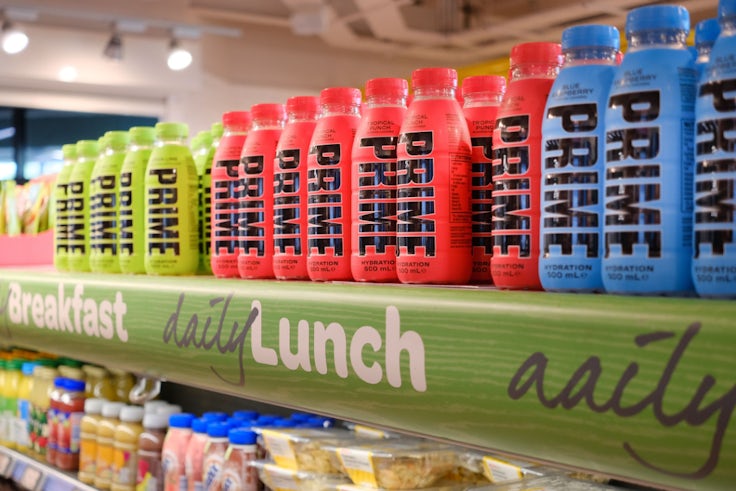Prime sees sales fall by almost 50% in 2024
Prime Hydration saw its sales drop by £63.1m this year, despite strong performances from fellow energy drinks brands Red Bull and Monster.

Prime Hydration sales declined by £63.1m in 2024, making it one of the fastest falling FMCG brands this year.
For the year to the beginning of September, sales dropped to £68m, from £131.1m in the same period a year earlier, which equates to a decline of 48%, according to NIQ data for The Grocer’s Top Products Survey 2024. Prime is the fastest falling food or drink brand in terms of sales this year, the survey found.
Prime, which was founded by creators KSI and Logan Paul, launched in June 2022 to much excitement. The product, manufactured by private label business Refresco, made headlines after fans queued up to get their hands on the brand, which initially was in scarce supply.
Prime boomed last year. In the year ended September 2023, the brand grew its sales £130.5m to £131.1m, according to NIQ data published by The Grocer.
Earlier this year, there were media reports that the brand was being heavily discounted by many retailers, suggesting that the high demand and scarcity its products once had has waned.
‘You can’t cheat the fundamentals’: Why Prime has been reduced to the bargain bin
While creator-founded Prime floundered, other brands in the energy drink sector flourished. Monster grew its sales by £103.6m while Red Bull grew by £84.7m. Unlike Prime, which was only created two years ago, Red Bull and Monster both have decades of brand equity, having been in existence since 1987 and 2002, respectively.
Red Bull’s advertising and brand enjoys considerable awareness and consideration with sustained investment in advertising and sports sponsorships. While Monster is younger comparatively, it too has invested in brand through partnerships with extreme sports competitions to reach its target consumer.
It’s not uncommon for brands in the consumer goods sector to experience a drop off after year one. Speaking to Marketing Week about Prime earlier this year, chief customer officer of System1 and host of the Uncensored CMO podcast Jon Evans cited research he did while at Britvic, which looked at the 20 most successful soft drink launches of the last decade.
That research found that more than half of those launches saw their sales decline in the second year after launch. He described the Prime phenomenon as being an exaggerated version of this trend and gave Red Bull as an example of a brand that was able to avoid a post-launch drop.
Creators are pioneering a new way of brand-building: Audience-orientation
“What they did is they started in a small part of the market first, they proved the concept,” Evans said. “And then they expanded gradually over time into new channels and to a bigger audience. But they did it in a very controlled way, and they also committed to it over a long period of time. They didn’t just do a big launch and then move on to the next thing.”
It doesn’t look like Prime is likely to turn to traditional brand-building to restore its fortunes. Its creators KSI and Logan Paul announced earlier this year they would be teaming up with YouTuber MrBeast to launch Lunchly, a lunch box meal kit that contains Prime drinks as well as MrBeast’s own brand, Feastables.
Among FMCG brands, disposable vape brand Elfbar was the only one to suffer a steeper decline and saw its sales fall £284m in the period. While this figure may suggest appetite for vapes is declining, the overall fastest growing FMCG product was SKE Crystal Bar, which saw sales increase £240.8m this year.






